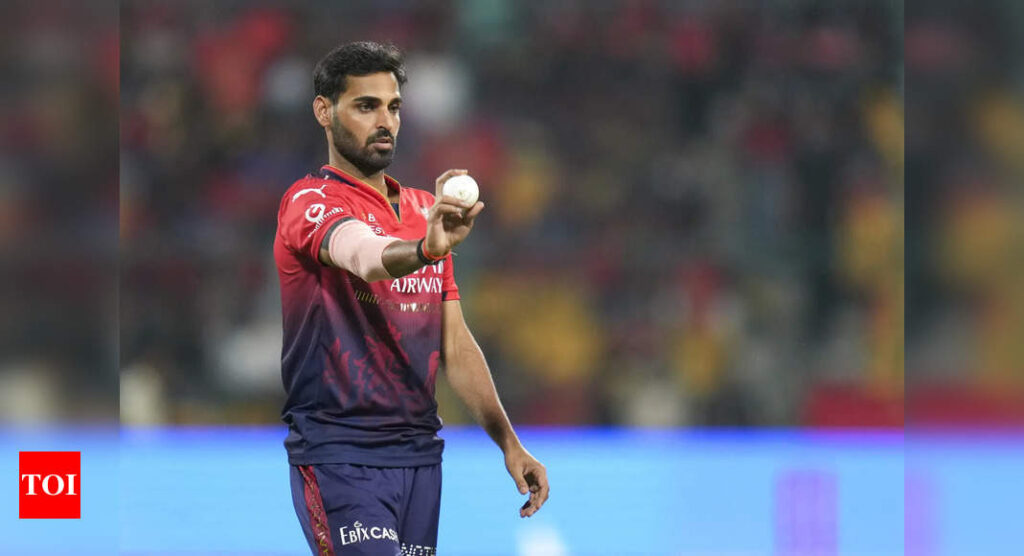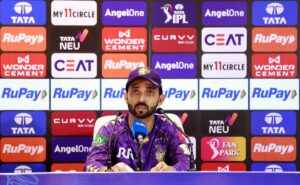
Bhuvneshwar Kumar Makes Candid Admission: "I Forgot I Can Use Saliva" as IPL 2025 Reverses COVID-Era Ban
Bhuvneshwar Kumar Makes Candid Admission: “I Forgot I Can Use Saliva” as IPL 2025 Reverses COVID-Era Ban
Bhuvneshwar Kumar has been honest about forgetting the reintroduction of saliva as a ball-polishing agent in IPL 2025 (PTI Photo)
Table of Contents
- Bhuvneshwar Kumar’s Candid Admission About Forgotten Saliva Rule
- How BCCI Reversed the COVID-Era Saliva Ban for IPL 2025
- Impact on Reverse Swing Bowling in IPL 2025
- Mitchell Starc’s Reverse Swing Masterclass Against Rajasthan Royals
- Bowlers’ Reactions to the Rule Change
- Future Implications for T20 Cricket Bowling Strategies
Bhuvneshwar Kumar’s Candid Admission About Forgotten Saliva Rule
In a refreshingly honest admission that has resonated with cricket fans around the world, Bhuvneshwar Kumar revealed he had completely forgotten about one of IPL 2025’s most significant rule changes. The experienced Royal Challengers Bengaluru (RCB) pacer confessed that the lift on the saliva ban for ball polishing had slipped his mind entirely until team staff reminded him of the opportunity.
“I forgot that I can use saliva,” the veteran fast bowler admitted candidly. “Yesterday when the (team) staff told me, I didn’t know that I have to use it. I am not sure if it will help or not, but now that I remember, definitely in tomorrow’s match (vs PBKS), I will put some saliva and see if it helps or not.”
Bhuvneshwar’s Candid Revelation
This surprisingly honest admission from Bhuvneshwar Kumar reveals how deeply ingrained the COVID-era protocols had become for many cricketers. Despite being one of India’s premier swing bowlers for years, even Bhuvneshwar needed a reminder about this significant change that could potentially enhance his bowling effectiveness in IPL 2025.
Kumar’s confession highlights the adaptation challenges faced by players who spent years conditioning themselves to avoid using saliva during the pandemic restrictions. The muscle memory and mental habits formed during that period have clearly persisted even after the official rule change.
How BCCI Reversed the COVID-Era Saliva Ban for IPL 2025
The Indian Premier League 2025 season has witnessed a significant shift in playing conditions with the Board of Control for Cricket in India (BCCI) officially lifting the ban on using saliva as a ball-polishing agent. This reversal comes after several years of restriction that was initially implemented as a health safety measure during the COVID-19 pandemic.
The decision to reintroduce saliva usage wasn’t made unilaterally. Reports indicate that multiple IPL captains had advocated for the change, recognizing the impact the ban had on bowling strategies and the balance between bat and ball in the T20 format. The BCCI, after consulting with medical experts and ensuring appropriate health protocols, approved the reversal for the 2025 season.
Ball Maintenance Evolution
Saliva has traditionally been crucial for maintaining the cricket ball’s condition, particularly for creating shine on one side to generate conventional and reverse swing. During the saliva ban, bowlers experimented with alternative methods like using sweat, but many found these less effective for generating the required shine and movement.
This rule change represents a return to pre-pandemic cricket norms while maintaining other enhanced hygiene practices that have become standard in the sport. The reintroduction of saliva has been welcomed by most bowling units across IPL franchises, despite some players like Bhuvneshwar Kumar taking time to readjust to the opportunity.
Impact on Reverse Swing Bowling in IPL 2025
The reintroduction of saliva as a ball-polishing agent has already begun to reshape bowling strategies in IPL 2025, with reverse swing making a dramatic comeback to the T20 format. This bowling art, which had largely disappeared from limited-overs cricket during the saliva ban, provides bowlers with a much-needed weapon against powerful modern batting lineups.
Reverse swing, which requires a significant differential between the rough and smooth sides of the cricket ball, becomes more achievable with saliva application. The ability to effectively polish one side of the ball while allowing the other to deteriorate naturally creates the aerodynamic conditions necessary for late movement through the air – a technique that has historically troubled even the best batsmen.
| Ball Maintenance Method | Effectiveness for Reverse Swing | Legality Status in IPL 2025 |
|---|---|---|
| Saliva | Highly Effective | Legal (Newly Reinstated) |
| Sweat | Moderately Effective | Legal |
| Artificial Substances | Very Effective | Illegal |
| Ball Roughening | Partially Effective | Illegal (Against Law 41) |
Fast bowlers who specialized in reverse swing before the pandemic are now rediscovering this valuable skill set. However, Bhuvneshwar Kumar’s admission highlights an interesting transition period as players who adapted to the restrictions now need to consciously reincorporate saliva usage into their bowling routines.
Mitchell Starc’s Reverse Swing Masterclass Against Rajasthan Royals
While Bhuvneshwar Kumar may have forgotten about the saliva rule change, one bowler who has enthusiastically embraced the opportunity is Mitchell Starc. The Australian pace sensation, representing Delhi Capitals in IPL 2025, delivered a remarkable exhibition of reverse swing bowling during their recent encounter against Rajasthan Royals.
Starc’s performance in the Super Over was particularly noteworthy, as he executed an astonishing 11 yorkers from 12 deliveries while maintaining speeds of around 145 kmph. The late movement generated through his expert use of reverse swing made these deliveries virtually unplayable, proving decisive in Delhi Capitals’ victory.
Starc’s Super Over Statistics
Mitchell Starc’s Super Over against Rajasthan Royals showcased the devastating potential of reverse swing in T20 cricket: 12 balls bowled, 11 yorkers executed, average speed of 145 kmph, and consistent late movement through effective use of saliva for ball maintenance. This performance has already become one of the talking points of IPL 2025.
Nitish Rana, a Rajasthan Royals player who faced Starc’s bowling, acknowledged the exceptional skill displayed: “Reverse swing had completely gone away from cricket, whether it was red ball or white ball. Suddenly, if someone can execute 11 yorkers in 12 balls at a 145 (kmph) pace, then you have to give Starc the credit.”
Bowlers’ Reactions to the Rule Change
The contrast between Bhuvneshwar Kumar’s admission of forgetting the rule change and Mitchell Starc’s immediate adoption highlights the varied reactions among fast bowlers to the reintroduction of saliva usage. While some have seamlessly incorporated the technique back into their bowling routines, others are still adjusting to the reversal of a restriction that had become second nature.
Delhi Capitals captain Axar Patel provided insight into Starc’s mindset during the crucial Super Over, noting: “Getting reverse swing is one thing, but executing it is very important. It was reversing, but at that time, under pressure, he (Starc) was executing it. I was just reminding him to be clear about the plans we made in the bowlers meeting. I was getting the same response: ‘Don’t worry, skip. I’ll do it.'”
Bowling Strategy Adaptation
Successful bowlers in IPL 2025 are those who quickly adapt to the reinstated saliva rule by: 1) Consciously remembering to use saliva for ball maintenance, 2) Developing team-wide ball management strategies, 3) Practicing reverse swing execution under pressure, and 4) Utilizing conventional and reverse swing as complementary weapons throughout different phases of the innings.
As the tournament progresses, teams with effective ball management protocols incorporating saliva usage may gain a significant advantage, particularly in death overs and high-pressure situations where the ability to generate reverse swing can prove decisive against aggressive batting.
Future Implications for T20 Cricket Bowling Strategies
Bhuvneshwar Kumar’s honest admission about forgetting the saliva rule reflects a transitional phase in T20 cricket that will likely evolve significantly as IPL 2025 progresses. The reintroduction of this traditional ball-maintenance technique has potential long-term implications for bowling strategies across all formats of the game.
For fast bowlers who developed their skills before the pandemic, like Bhuvneshwar Kumar, the challenge involves consciously reincorporating saliva usage after years of conditioning themselves against it. Younger bowlers who entered professional cricket during the restriction period may need to develop these skills from scratch, potentially creating a temporary advantage for veterans who can quickly readapt.
“I am not sure if it will help or not, but now that I remember, definitely in tomorrow’s match (vs PBKS), I will put some saliva and see if it helps or not.”
— Bhuvneshwar Kumar, Royal Challengers Bengaluru
As bowlers throughout the IPL experiment with saliva usage and refine their reverse swing techniques, we may witness a rebalancing between bat and ball in T20 cricket. The format, often criticized for heavily favoring batsmen, could see bowling strategies evolve to counter the advantage of modern bats and smaller boundaries.
Whether Bhuvneshwar Kumar’s initial forgetfulness transforms into a strategic advantage in upcoming matches remains to be seen. However, his candid admission provides a fascinating glimpse into the practical challenges of implementing rule changes in professional cricket, even when those changes restore traditional aspects of the game.






